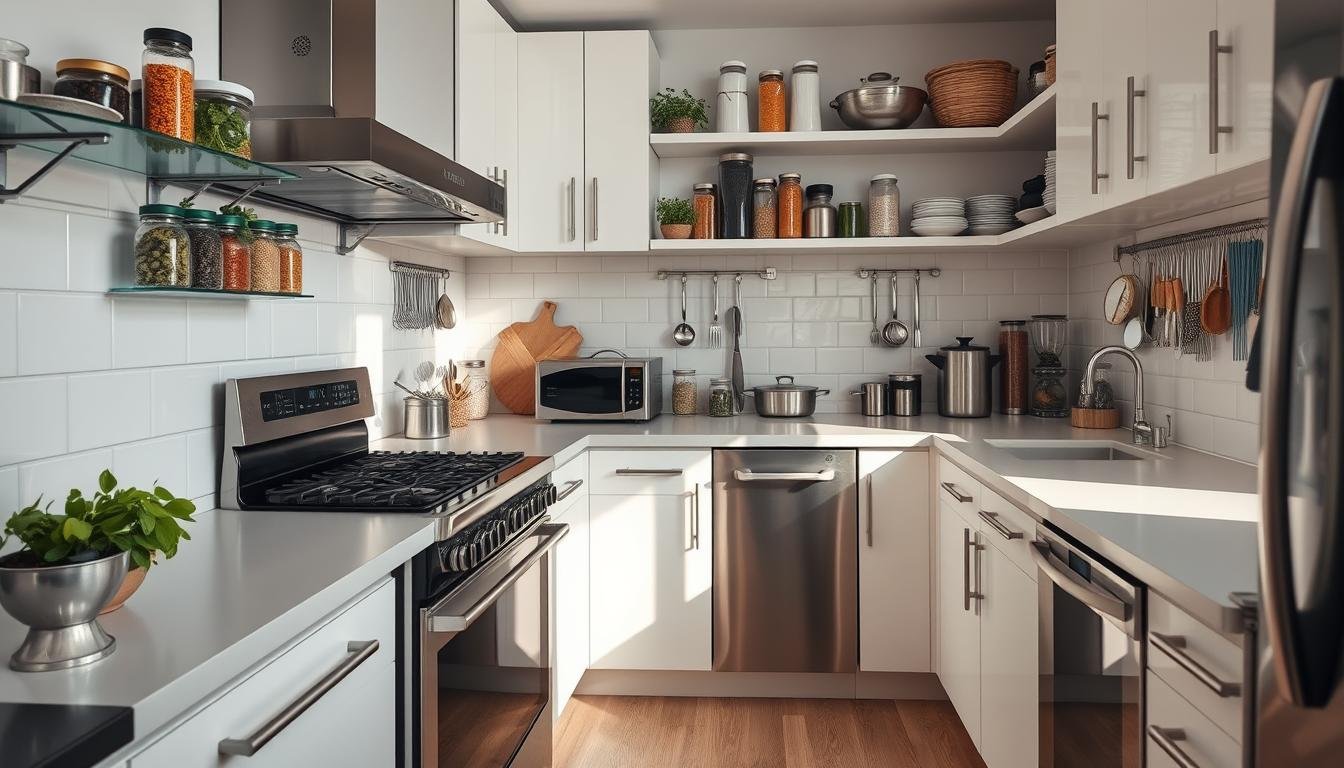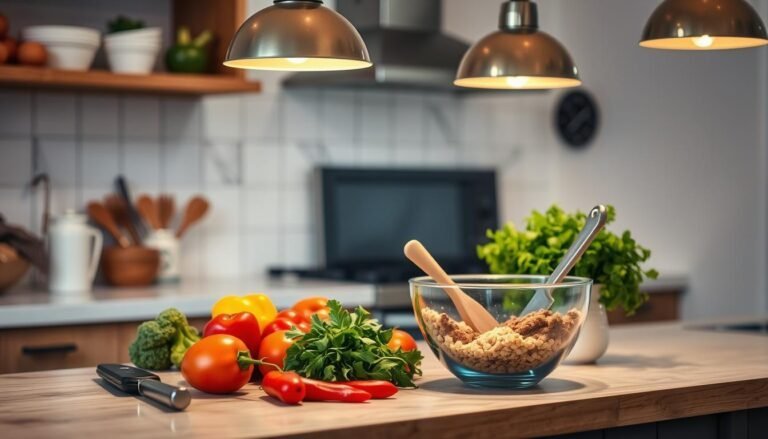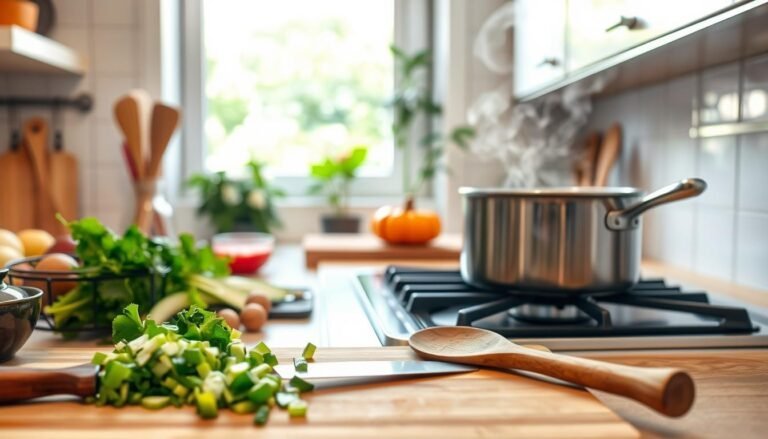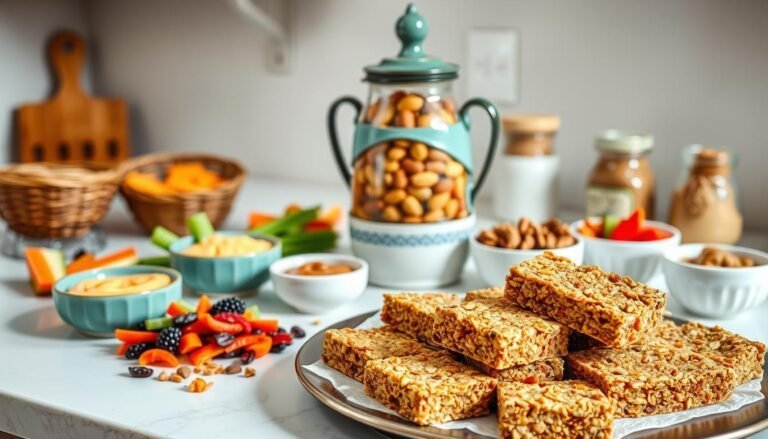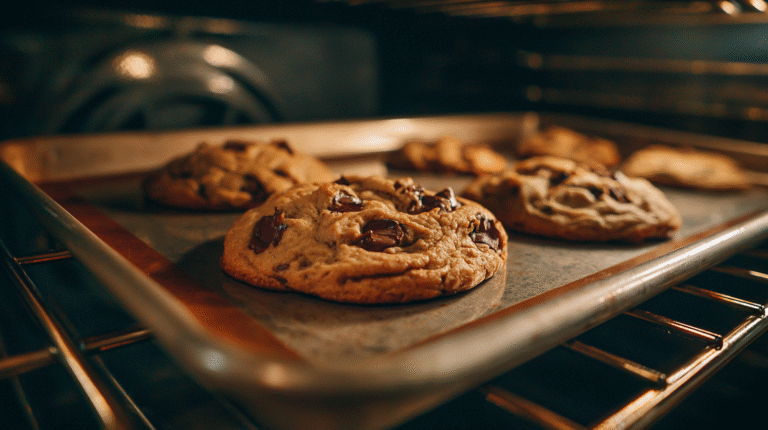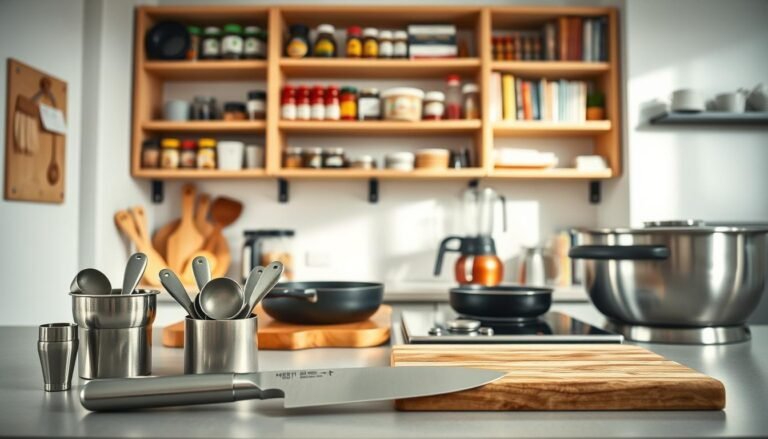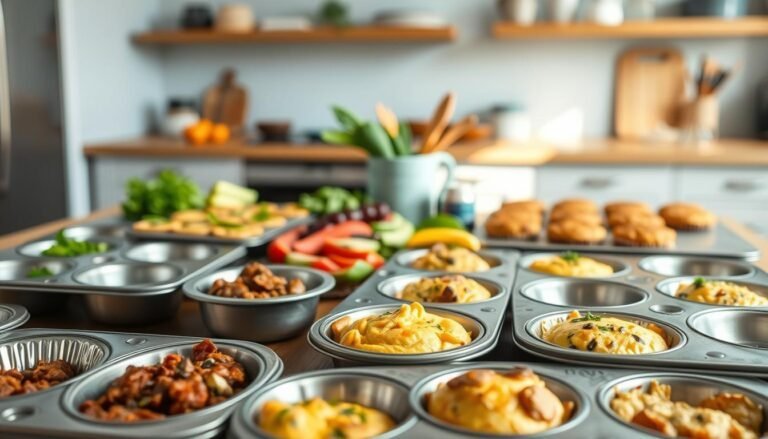Disclosure: This Post Contains Affiliate Links; We earn a commission on purchases.
Keeping your kitchen clean and organized is key for a smooth cooking experience. A messy kitchen can make you stressed and slow you down. By using good cleanup tips, you can make cooking easier and more fun.
Cleaning as you go is a simple yet effective way to keep your kitchen tidy. This means washing utensils and cleaning surfaces while you cook, not after. It helps you avoid the big clean-up job later.
Key Takeaways
- Clean as you go to avoid post-meal cleanup.
- Prepare ingredients in advance to streamline cooking.
- Utilize the right cleaning tools for efficient kitchen organization.
- Maintain a clutter-free kitchen to reduce stress.
- Implement a kitchen organization system that works for you.
Preparing Your Kitchen for Easy Cleanup
Efficient kitchen cleanup starts with preparation. By setting up your kitchen to minimize mess, you can save time and effort. This involves planning, organizing, and the right mindset.
Setting Up a Clean Workspace
Start by clearing off countertops and decluttering your kitchen. Remove items that get in the way of cooking or cleaning. A clean workspace improves cooking efficiency and simplifies cleanup. Clearing your workspace is the first step towards a stress-free cooking experience.
Strategic Placement of Cooking Tools
Organize your cooking tools and utensils for easy access. Use utensil holders or dividers in your drawers. Having tools within reach saves time and reduces mess. Strategic placement of your cooking tools can save you a significant amount of time during cooking.
Creating Designated Mess Zones
Designate specific areas for messy activities like food preparation. Use a cutting board or a specific countertop for chopping vegetables. This keeps the rest of the kitchen clean and makes cleanup easier. Having designated mess zones is an efficient cleaning hack.
Prepping Ingredients to Minimize Mess
Prepping your ingredients before cooking can reduce mess. Chop vegetables, measure spices, and have all ingredients ready. This streamlines cooking, reduces spills, and makes cooking more enjoyable. By prepping ingredients, you’re using a practical cooking mess solution.
By following these strategies, you can make your kitchen easy to clean. This saves time and makes cooking more fun. Effective kitchen organization is essential for this.
Quick Cleanup Tips for Messy Cooking Sessions
Cooking can get messy, but you can keep your kitchen clean. It’s not just about looks. It also makes cooking easier and less stressful.
The “Clean As You Go” Method
The “clean as you go” method is simple and works well. Clean utensils and surfaces as you use them. This stops mess from building up.
Benefits of cleaning as you go include less stress, more time saved, and a better cooking experience.
Managing Spills and Splatters Immediately
Spills and splatters happen in the kitchen. It’s important to clean them up right away. This stops stubborn stains and messes.
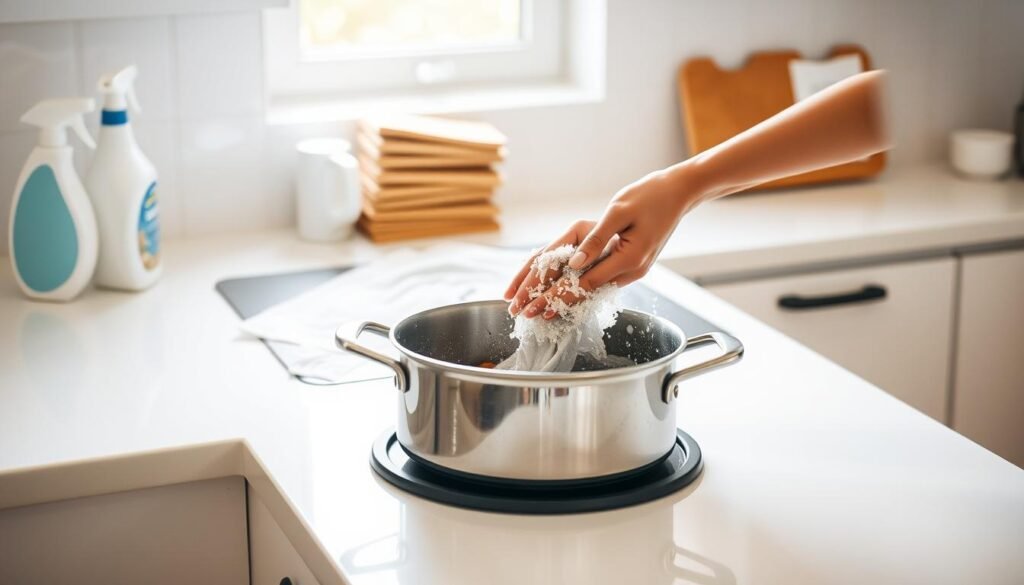
Efficient Use of Downtime While Cooking
Cooking often means waiting for food to cook. Use this time to do quick cleanups. This is called multi-tasking.
One-Minute Cleanup Tasks
One-minute tasks can really help. For example, wiping down the stove, cleaning utensils, or sweeping the floor. These tasks are quick and keep your kitchen clean.
Multi-Tasking Cleaning Strategies
Multi-tasking means doing more than one thing at once. While waiting for food, wash utensils, load the dishwasher, or clean countertops. This saves time and keeps your kitchen clean.
Using these streamlined cooking cleanup tips makes keeping your kitchen tidy easy. The trick is to stay on top of messes and use your time wisely while cooking.
Post-Cooking Cleanup Strategies
After cooking, the kitchen can get messy. It needs a good cleanup plan. This keeps the kitchen clean and safe.
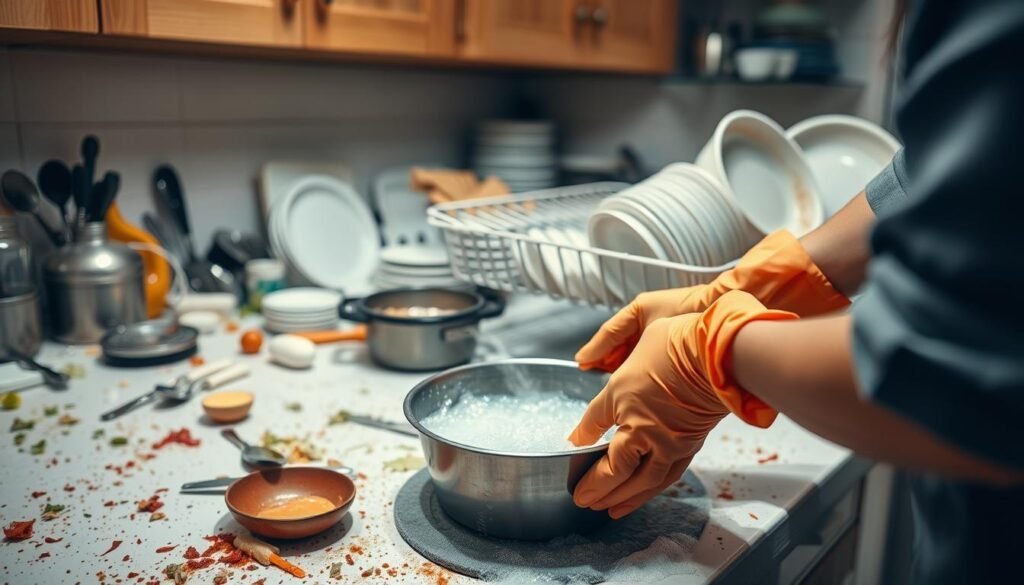
Tackling Different Kitchen Surfaces
Each kitchen surface needs its own cleaning method. Countertops and backsplashes need gentle cleaners. They help remove stains and splatters without damage.
Countertops and Backsplashes
Use a mild detergent and a soft cloth for countertops and backsplashes. This removes debris and stains. Regular cleaning stops grime and bacteria buildup.
Stovetops and Ovens
Stovetops and ovens need strong cleaning. Use a degreaser or baking soda and water to remove grime. For tough stains, let the solution sit before scrubbing.
Sinks and Faucets
Sinks and faucets must be cleaned often. Use a gentle cleanser and a soft cloth. Dry them well to avoid water spots.
Dealing with Stubborn Food Residues
Removing tough food residues can be hard. Burnt-on food and grease spills need special cleaning methods. These methods avoid damaging the kitchen.
Burnt-On Food Solutions
For burnt-on food, make a paste from baking soda and water. Apply it, wait 30 minutes, then scrub and rinse with warm water.
Grease and Oil Removal
To get rid of grease and oil, use a degreaser or water and white vinegar mix. Apply, wait a few minutes, then wipe with a soft cloth.
Efficient Dishwashing Techniques
Good dishwashing is key for cleanup. Use hot soapy water and a sponge or brush. Soak dishes in tough cases before washing.
By following these cleanup tips, you can keep your kitchen clean and organized easily.
Essential Tools and Products for Faster Kitchen Cleanup
Having the right tools and products is key for quick kitchen cleanup. A tidy kitchen makes cooking fun and cleaning easier. With the right tools, you’ll spend less time cleaning up after meals.
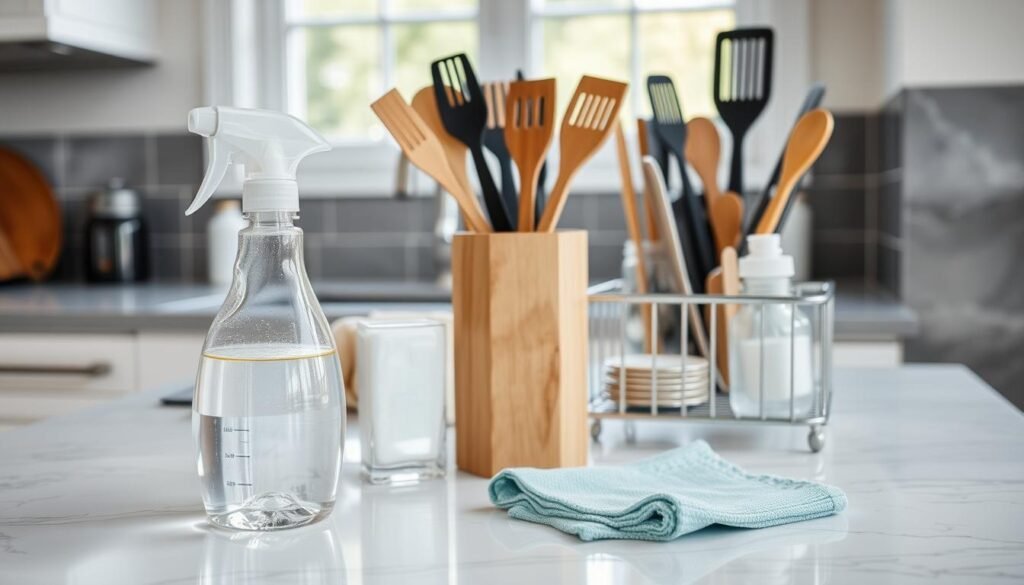
Must-Have Cleaning Tools
Good cleaning tools are essential. You’ll need a quality sponge or dish cloth, a scrub brush for tough spots, and a microfiber cloth for surfaces. A dish rack and a drying mat help with wet dishes and prevent water spots.
Time-Saving Cleaning Products
The right cleaning products save time. Multi-surface cleaners work on many surfaces. All-purpose cleaning sprays and dish soap that handle grease are also great.
Eco-Friendly Cleaning Solutions
For a green approach, try eco-friendly cleaning solutions. Natural or biodegradable products work well. Use baking soda and white vinegar for gentle, natural cleaning.
Organizing and Storing Your Cleanup Arsenal
Keep your cleaning tools and products organized. Use caddies or baskets under the sink or in a cleaning area. This keeps your kitchen neat and saves time when cleaning.
By using these tips and the right tools, kitchen cleanup becomes faster and easier. You can enjoy your kitchen time without worrying about a messy cleanup.
Conclusion
Using Quick Cleanup Tips for Messy Cooking Sessions makes cooking better. Get your kitchen ready for easy cleaning. Use quick strategies and the right tools and products.
Good kitchen maintenance means a clean workspace and quick spill control. Use downtime wisely while cooking. These habits cut down cleanup time and make it easier.
Follow these tips for a stress-free cooking time. Keep your kitchen clean with little effort. Start using these Quick Cleanup Tips for Messy Cooking Sessions and kitchen maintenance tips today. Change your cooking routine for the better.
FAQ
What is the best way to maintain a clean kitchen while cooking?
How can I minimize mess while prepping ingredients?
What are some efficient dishwashing techniques?
What are some must-have cleaning tools for kitchen cleanup?
How can I deal with stubborn food residues on kitchen surfaces?
What are some eco-friendly cleaning solutions for kitchen cleanup?
How can I organize and store my cleanup arsenal?
What is the importance of creating designated mess zones in the kitchen?
How can I make the most of downtime while cooking to clean up?

With a passion for making good food easy, Ryan focuses on tips, tricks, and approachable advice for anyone who wants to eat well without spending hours in the kitchen. Whether you’re prepping lunchboxes, feeding a busy family, or just need something tasty in a pinch, Ryan’s here to help you keep it quick and simple—one bite at a time.
Subscribe to Our Newsletter

